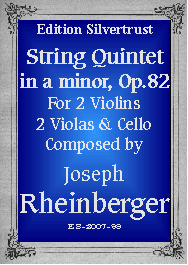Presents
Joseph Rheinberger
String Quintet in a minor, Op.82
For 2 Violins, 2 Violas & Cello
 Rheinberger
composed the String Quintet in a minor in just under a month in June of 1874.
Upon its premiere, the critics wrote:
Rheinberger
composed the String Quintet in a minor in just under a month in June of 1874.
Upon its premiere, the critics wrote:
“This Quintet is a highly individual and profound composition, rich in good ideas and powerful timber effects."
The Editor of The Chamber Music Journal discussing it stated, "It is, in fact, as good or better than any string quintet from the Romantic era."
Joseph Gabriel Rheinberger (1839-1901) was born in Vaduz, the capital of Liechtenstein. At the age of 5, young Joseph was given piano and organ lessons from a local teacher. His talent was immediately discovered and was of such a substantial nature that with the help of a scholarship he was sent to the Royal Conservatory in Munich where he studied with Franz Lachner, one of Schubert’s close friends and an important composer in his own right. Rheinberger, who remained in Munich for the rest of his life, was in great demand as an organist and choral master. He eventually became conductor of the important Munich Choral Society and served as voice coach at the Royal Opera where he got to know Wagner. He also taught at the Royal Conservatory where he held the position of Professor of Composition for nearly 40 years.
Remembered today only for his organ compositions which are considered the most important ever written after those of Bach, during his life time Rheinberger was a much respected composer, generally ranked after Brahms and Wagner as the most important living German composer. Furthermore, he was also generally regarded as the leading teacher of composition during most of his lifetime. Among his many students were Humperdinck, Wolf-Ferrari, George Chadwick (whose quartets we are publishing) and Wilhelm Furtwangler.
The String Quintet, which is in four movements, is described by the famous chamber music critic Wilhelm Altmann as follows:
“The opening movement, Allegro, begins in a Mendelssohnian fashion with a fleet but hard-driving main theme. The wonderfully contrasting second theme is both lyrical and quieter but ingeniously holds on to the rhythmic features of the first theme. The excellent coda is introduced by an original "trumpet" call. The second movement, Adagio molto, has for its main subject a highly romantic lied. The excellent accompaniment is unique and quite original. The middle section consists of a powerful and passionate interlude. In the Scherzo vivace which follows, we find a highly rhythmic dance melody as the main theme while the trio brings a lovely, lyrical duet. Both the main theme and the second theme of the fiery, Hungarian-flavored memorable finale, entitled Rhapsodie non troppo mosso, are absolutely magnificent and are treated in a highly individualistic fashion. A masterpiece, and yet it plays so well and at the same time presents no real difficulties for amateurs."
Need we say more. Listen to our sound-bites and see if you do not agree. In our opinion, few works deserve revival more than this one. Long out of print, it is a pleasure to reintroduce it.
Parts: $29.95
Parts & Score: $36.95